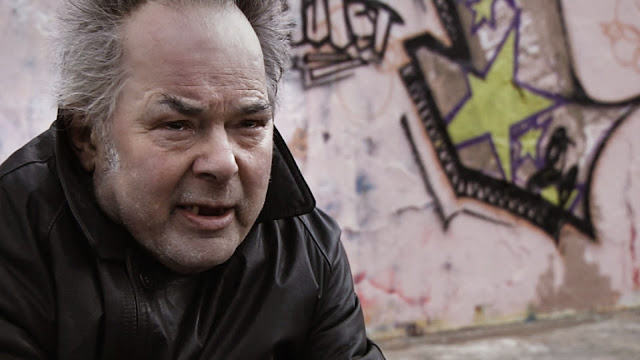The great thing about the Robert Burns Centre Film Theatre’s
Film Club is that it does throw up some rather off kilter movies at times. By
that I don’t mean bad films I mean something a little different and something
you normally would not get the chance to see in a cinema. The Enigma of Kasper Hauser
(1974) is a fascinating film written and directed by the German filmmaker Werner Herzog who along with Rainer Werner Fassbinder,
Margarethe von Trotta and Wim Wenders, was said to be one of the leading lights
of the New German Cinema and is probably best known for feature films that
include Aquirre, The Wrath of God (1972), Fitzcarraldo (1982) Rescue
Dawn (2007) My Son, My Son, What Have
Ye Done (2009) and the rather unfortunate remake of The Bad Lieutenant
(2009). His most recent piece of work, From One Second to the Next (2013) was released on line and
demonstrated the perils of texting on a mobile phone while driving. Although he
has made many documentaries this latest is only 35 minutes long and is seen as
a wee bit of a departure for the man that Francois Truffaut called ‘the most
important film director alive’
 |
| Bruno S as Kasper Hauser. |
Tony Barbour eventually introduced this week’s film, I say
eventually because at one time it could have been one of three hosts!!! The Enigma of Kasper Hauser, is
based on a true historical story of a young man who suddenly and mysteriously appears in the
streets of Nurnberg in the 1820’s bearing a letter asking the towns people to
look after him. He had been cruelly treated and deprived of virtually all
normal sensory and educational input and forced to spend the first seventeen
years of his life chained in a tiny cellar with only a toy wooden horse for
company. He was devoid of all human contact except for a mysterious man in a
black overcoat and top hat that brought him food. So his long awaited introduction
to the sophisticated and worldly society of Nurnberg is as an adult child.
Herzog has often used actors or non-actors who embody the
character they portray in an intense way: making them at times very hard to
work with. Tony gave Klaus Kinski as an example an actor who appeared in Aquirre, Fitzcarraldo, and Nosferatu:
Phantom of the Nacht (1979) and 1988’s Cobra
Verde and was legendary for his rages and tantrums. But Herzog channelled
these into memorable performances of larger than life characters.
The star of tonight’s movie is as interesting as the film itself,
Bruno Schleinstein, known as Bruno S is not a professional actor; he is
described as a street performer and sometimes forklift driver, the son of a
prostitute who spent some 23 years locked up in a mental institution. Herzog
first came across the actor in a documentary about street musicians and not
only cast him as Hauser but also as the lead in Stroszek (1977) a film written in four days specifically for actor.
Tony describes his performance in Kasper
Hauser as radiating a stubborn
simplicity of character, which is ideally suited to the portrayal of a
historically well-documented character the abandoned child Kasper Hauser.
With Mike Gray opined that despite Bruno S’s age 41, he perfectly portrays the 17 years old Kasper with a mix of real naïve
simplicity, a hundred mile stare and even some dark humour. It would appear
that the director is more interested in the behaviour of his protagonist than
resolving the many questions raised by the story. Herzog was criticised for
taking advantage of a mentally challenged person but I think the viewer should
ask the question what would have happened to Bruno S if Herzog had not found
him?
According
to the late critic Roger Ebert: "Werner
Herzog's films do not depend on 'acting' in the conventional sense. He is most
content when he finds an actor who embodies the essence of a character, and he
studies that essence with a fascinated intensity. This "essence" was
extracted from Bruno with difficulty[1]".
"Bruno is a man whose life in his youth was
catastrophic and obviously made him a 'difficult' person to deal with,"
Herzog explained. "Sometimes he
would stop work by ranting against the injustices of the world. I would stop
the entire team in their tracks." Herzog would tell them: "Even if it takes three or four hours of
non-stop Bruno speaking about injustice we … would all listen. I would always
make physical contact with him. I would always grab him and just hold his
wrist. Otherwise, he is a man of phenomenal abilities and phenomenal depth and
suffering. It translates on the screen like nothing I have ever done translates
on to a screen. He is, for me, the Unknown Soldier of Cinema.[2]"
The
composition and camerawork are excellent and you can’t help build an empathy
with Bruno S’s portrayal of Hauser and it’s certainly not a film to be easily
forgotten. A final word from Mike Gray
about this splendidly unique movie in that in his opinion the very politically acute left leaning
Director (Herzog) exploits as an allegory for the awakening of sensitivity to
the absurdities of German middle class life and pretensions.


No comments:
Post a Comment